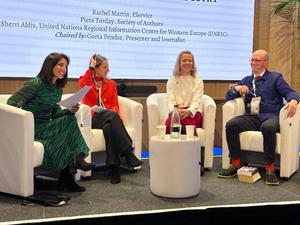At the 2024 London Book Fair last week, sustainability was one of the biggest topics of the show. On Tuesday, journalist Geeta Pendse moderated a main stage panel on the subject that featured Sherri Aldis, director of the United Nations Regional Information Center for Western Europe, Rachel Martin, global head of sustainability at Elsevier, and children's book author Piers Torday.
 |
|
| Left to right: Geeta Pendse, Sherri Aldis, Rachel Martin, Piers Torday | |
Aldis brought up misinformation and disinformation as major obstacles in the way of climate action and the fulfillment of the U.N.'s Sustainable Development Goals. She called misinformation and disinformation "pervasive in society" and called for a "multi-stakeholder approach" to combating it.
The U.N. began working on the problem in earnest during the Covid-19 pandemic in response to the amount of health misinformation that was spreading at the time. At that time the U.N. developed two mechanisms for combating misinformation: using "trusted locals" to disseminate facts and science, and fostering media literacy.
In June, the U.N. will publish a new code of conduct for information integrity on digital platforms, which is meant to provide a "gold standard" for governments, policy makers, and the media to use. She also noted that the U.N. will examine the current business models of online spaces, which generally give incentives to "hate speech and lies," and consider alternatives.
Another difficulty, Martin said, is the harassment and targeted attacks that academics receive. She discussed a recent survey that found that one in four researchers have either experienced online abuse directly or know a close colleague who has, and she mentioned climatologist Michael Mann, who in 1998 first published the "hockey-stick graph" depicting the rise in global temperatures. In February, he won a $1 million defamation case against conservative writers who accused him of manipulating data and likened him to child molester Jerry Sandusky.
Martin further pointed out that the classic assumption that simply providing information will change behavior "kind of out of date." People need to experiment with contextualizing and synthesizing science in news, and she noted that generative AI could provide some good opportunities for synthesizing vast amounts of peer-review content. It could also be used in the developing world to create policy briefs on climate and the environment.
Torday remarked that as a fiction author, he did not so much deal in facts as in values, and he sought to foster in young people a cultural respect for the facts as well as a culture of hope. The "doomsday narrative" has dominated discussions about climate change for a long time now, he said, and while the reality of climate change is indeed "perilous," that type of narrative "doesn't always cut through." People can feel attacked for their lifestyle and become defensive, or ignore the problem entirely.
Changing the narrative, he stressed, is "actually vital" to getting people to accept the facts, and in his work he tries make the point that small changes matter, cultural behavior counts, and "no problem is too insurmountable." Martin agreed that people will do more for hope than out of "despondence or fear," and Aldis said the publishing industry is a valuable ally in not only getting the facts out there, but also getting people inspired and motivated.
In 2021, Torday was behind an open letter to U.K. publishers and literary agents calling for united action across the industry on climate change. It was signed by more than 100 writers and illustrators, and Torday recalled that he went about it by contacting as many authors as he could and asking if they thought the values they presented on the page were matched by the values of that page. The answer, overwhelmingly, was either "I'm not sure, or no."
Since then, "people did come together," and over the past few years there have been "positive steps." Both the U.K. Publishers Association and International Publishers Association have developed carbon calculators publishers can use to assess the carbon footprint of a given title, and publishers as well as trade bodies have been increasingly collaborating and sharing data. Torday noted that there is still a "long road to travel," and much more work needs to be done related to returns, shipping, printing, and other parts of the supply chain. For sustainability, he said, there is "no silver bullet."
An encouraging option is the increase in the use of print-on-demand, with Torday remarking that given the improvements in quality of print-on-demand titles in recent years, consumers might already be reading print-on-demand titles without realizing it. The "stereotype" that print-on-demand is automatically cheap or low-quality, he continued, is no longer the case.
There are advances in printing and materials that can drastically lower the carbon footprint of print books without sacrificing readability or quality, Torday said. To illustrate this point, he showed the audience two copies of the Danish classic Lucky Per by Nobel Prize-winner Henrik Pontoppidan. One edition had a carbon cost of about 2.2 kg; the other had a cost of only about 350 grams. That more sustainable version, Torday said, does not omit a single word from the text and has normal-sized type. If every book was made using those methods, it would be the equivalent "to taking 15 million cars off the road."
The panelists also discussed the misconception that digital is automatically more sustainable. Martin acknowledged that while a digital copy of a book typically has a lower carbon cost than a print copy, it isn't that simple. Those estimates do not take into account the carbon cost of the device being used to read the e-book, whether that be a smartphone, tablet, or dedicated e-reader, or the carbon cost of the data centers that power digital infrastructure. Torday also observed that while a physical book may have a higher carbon cost than an e-book, the physical copy can be shared from reader to reader and last 100 years.--Alex Mutter

